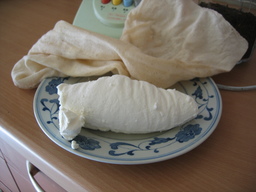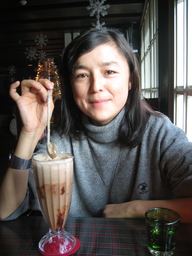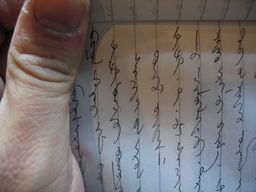
Homemade Cream Cheese
2006.03.30 Urumqi
 Homemade Cream Cheese |
I suppose there is something of a springtime here, but each of the past couple years I found the temperature goes from too cold to too hot in about two weeks. The reverse process happens half a year later, with the onset of pleasant autumn weather giving way to freezing temperatures in under a month.
I've been quite the dutiful student this term, attending class on-time every day. This morning though, I decided to ditch--today was the first time I slept late and played hooky. I did plan on attending my afternoon calligraphy session with Abdu-Shukkur, but he himself called to cancel. So, this has turned into a fine day to laze about the house over the afternoon.
I spent the early afternoon baking another cheesecake. I've been baking cheesecakes frequently since finding that strained yoghurt is a spot-on duplicate for cream cheese. Some days ago, after seeing my homemade cream cheese, Nisagul realized that something similar is found certain places around Xinjiang. The Uighurs call their cream cheese suzma, it's generally unavailable around Urumqi. However, suzma is an ingredient required for making dogh-ab, a sort of Persian buttermilk. There's not much dogh-ab here in Urumqi, it's a beverage more common around Kashgar and other parts of Southern Xinjiang.
I figured I knew a good place to track suzma down: the old Consulate Road near Urumqi's Grand Bazaar is the place to find goods from across Asia. Consulate Road is the old street where a Russian consulate once stood, back when control of this region could have fallen into Russian, British, or Chinese hands. While I don't know which building might have once housed the diplomatic mission, if it even still stands, the neighborhood has remained an international nexus. Consulate Road's shops are frequently re-stocked with goods coming in from former Soviet states. It's common to see Pakistani traders wearing their traditional baggy shalwars-qamiz. At the eastern end of the road is one of Urumqi's more active mosques, adding to an interesting jumble of faces, beards, and outfits.
I found a woman selling homemade yoghurt on the north side of Consulate Road, just across from the mosque. The yoghurt is made for immediate consumption, sold in individual ceramic bowls. A thin board is placed between each bowl, allowing them to be stacked into columns, one bowl upon another. This woman selling yoghurt was lucky as street vendors go: she actually had a small stall within a building. Her stall had room enough for just one small table, a bench, and stool or two, but gave her a legitimate business presence. Most people who sell goods on the street run the risk of their pushcart and merchandise being confiscated during a police bust.
The yoghurt-seller wore a kerchief and veil, leaving only her eyes visible. Covered women are a common sight around Xinjiang, but few of my friends would wear a headscarf, let alone cover their face. Perhaps after more interaction I'll be able to adjust, but I find it awkward when trying to speak with somebody whose facial expressions I can't read. At least I could see this woman's eyes--some women around Xinjiang cover their entire face and upper-body with a large sheet of brown gauze.
I asked the yoghurt vendor whether she had suzma; she replied that if I left a deposit she could have some brought from her home within half-an-hour. I forked over 7.50 yuan, about one U.S. dollar for a half-kilo of cream cheese. I found it was pretty good stuff... a nice, soft texture, making for a nice cheesecake. I was even happier to have Bahar's affirmation a few days later, when I had her sample her first cheesecake and compare the cream cheese I made with that I bought. The cream cheese I made had superior taste and texture.
Nisagul and I finally moved into the new flat about two weeks ago. We've put a tremendous amount of effort into fixing the place up, having curtains sewn, fixing broken pipes, and ripping out useless electrical wiring. The biggest task was cleaning up after Kitami. I tend to hold the stereotype that most Japanese people keep their homes impeccably neat. The state of the apartment reminded me how operating on stereotypes is so often inaccurate: Kitami not only never once cleaned his flat, he seldom walked his dog. I don't know if he ever cleaned up after the mess his dog left, but several rooms had large sticky patches and piles to clean before we took anything else on.
At last, the apartment is starting to feel comfortable, becoming "home". I don't think it will ever be as nice as my former apartment was right next door, though this place does have some advantages. There are three full bedrooms and two baths. Running hot water is a rarity in apartments across China, my old place had only an electric water heater for taking showers. A previous foreign family who lived here some years prior ran hot water through the sinks in both the kitchen and one of the bathrooms, making washing-up far easier.
Additionally, the kitchen is top-notch. It's far larger than the kitchen in my last flat, with lots of new cupboards and storage space. The refrigerator is full-sized. Best of all, there is a gas range to cook with. My previous apartment had only a dorm-sized fridge and electric hotplate.
 Shamsiya |
In recent weeks I've had a couple unwanted encounters with language-leeches. Random people on the streets of Chinese cities often approach westerners, requesting a friendship, demanding a phone number, or proposing that they receive free English lessons. I term these characters language leeches, though perhaps author Vikram Seth was more accurate when he wrote about his experience studying in Nanjing. Throughout the pages of his Xinjiang/Tibet travelogue, From Heaven Lake, he preferred the term "language-rapist".
My recent leech/rapists have been two separate Xinjiang University students who had seen enough of me around campus to realize that I was a foreigner. Both opened with a barrage of personal questions that I clearly was not receptive to. "I've been watching you! You have been away! Do you have wife? Where do you live?" While in years past I might have chatted for a bit, I've started to shut them out immediately, ending the conversation without giving them a chance. Maybe if they opened with, "Hello," or, "Is it okay if I talked with you?" I might be a bit nicer. Maybe.
As foreigners go, I actually have it relatively well. People usually presume me to be Uighur, so I don't get the attention of somebody with fairer features. Tiffany has built-up a cold defense, indifferently ignoring the leech/rapist or responding coldly to their overtures. She's endured the routine so many times it's easy for her to dismiss these characters, a state I haven't arrived at yet, but am getting close to. She's right in saying that they are interested in her solely because she is somebody they can use, somebody who might potentially help their English.
I know that the majority of these people are students who lack the experience with foreign social conventions to avoid awkward mistakes when attempting to speak with a foreigner. That said, I don't think that it's appropriate in any of the local cultures to make friends with random people on the street by enquiring about personal life.
 Mongolian Script in Meengday's Notebook |
Sometimes I wonder if I myself don't fit into the same category. My friends are almost exclusively local minorities, perhaps I too qualify as language-leech. Recently I've been spending a fair amount of time with somebody I met while helping Kitami move out. Meengday grew up here in Xinjiang and currently works as an announcer for Xinjiang radio's Mongolian-language service. She delivers the news and commentary to Mongolian listeners across Xinjiang. In addition to her mother-tongue of Mongolian she can get by in Uighur and Kazak as well. We speak with each other in Chinese.
I know that I would find somebody like her, who enjoys travel and has an interesting background, fair potential to be friends anyway. But I know that I'm also swayed by the fact that we speak exclusively in Chinese and that she can write in that cool, sideways, traditional Mongolian script.